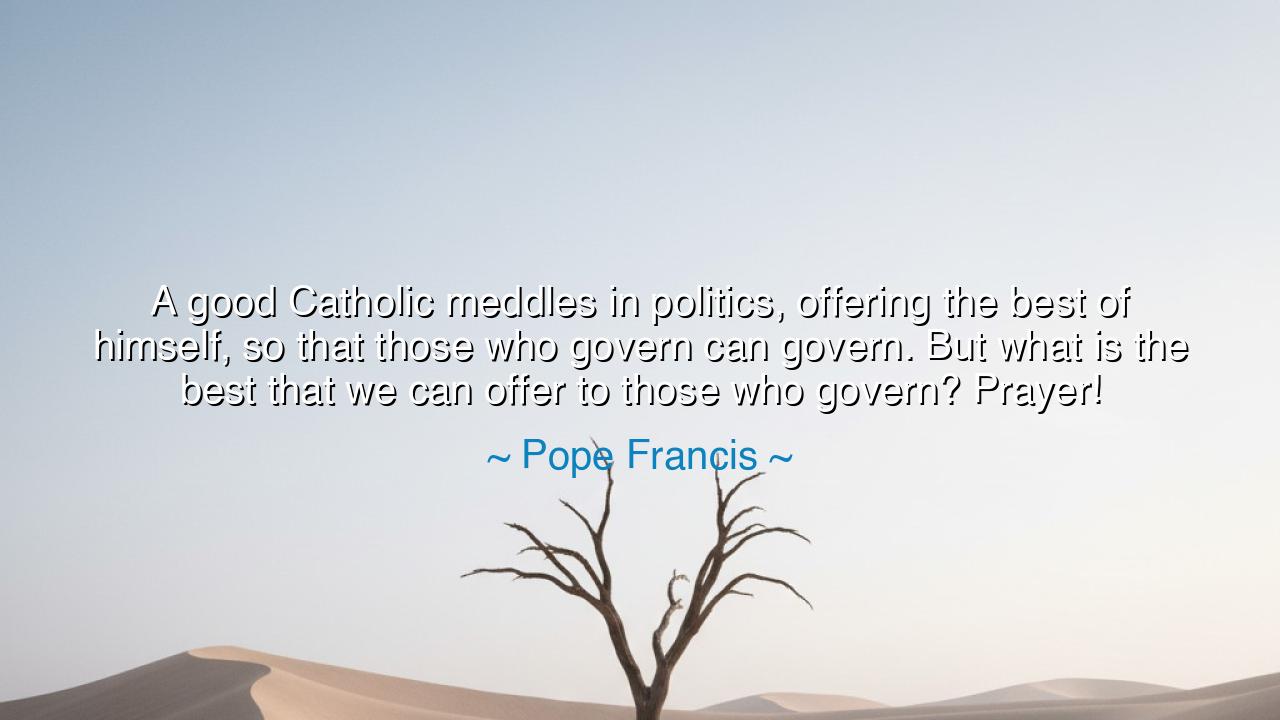
A good Catholic meddles in politics, offering the best of
A good Catholic meddles in politics, offering the best of himself, so that those who govern can govern. But what is the best that we can offer to those who govern? Prayer!






Faith and governance are two mighty rivers that shape the course of human history. When Pope Francis declared, “A good Catholic meddles in politics, offering the best of himself, so that those who govern can govern. But what is the best that we can offer to those who govern? Prayer!” he spoke with the voice of a shepherd guiding his flock. His words remind the faithful that politics is not a realm to be shunned, for it touches the lives of all, especially the poor and the vulnerable. Yet, he also reveals that the greatest offering to leaders is not merely protest or policy, but prayer, the spiritual lifeblood that sustains the soul of a nation.
At the heart of this teaching is the idea of engagement without corruption. To “meddle” in politics does not mean to grasp for power or to manipulate rulers for selfish ends. Rather, it is the duty of every person of faith to bring virtue, justice, and truth into the public sphere. A good Catholic must not remain silent in the face of injustice, for silence allows darkness to grow unchecked. But even as they act, they must remember that earthly rulers are fragile beings, burdened by immense responsibility. What sustains them most is not anger or division, but the invisible strength of countless prayers rising like incense to heaven.
History offers many examples of this sacred balance. During the reign of Emperor Constantine, the early Christians did not seize thrones or armies to spread their faith. Instead, they transformed the empire through their witness, their service to the suffering, and their prayers for those who held power. In time, their quiet strength reshaped the laws and morals of Rome itself. This shows the deep truth of Pope Francis’s words: while political action has its place, it is spiritual action that most deeply changes the heart of a nation.
Prayer, in this sense, is not passive. It is a form of spiritual warfare, a mighty force that calls upon divine wisdom to guide those who lead. Consider St. Thomas More, who served as a counselor to King Henry VIII. When the king’s ambition threatened the unity of the Church, More resisted not with rebellion, but with prayer and steadfast conscience, even unto death. His legacy endures because his actions were rooted in the higher kingdom of God, proving that the prayers of the faithful can outlast the decrees of tyrants.
Yet Pope Francis’s message also carries a warning. When politics is pursued without prayer, it easily descends into corruption, division, and the idolatry of power. Without the grounding of spiritual values, rulers lose sight of their sacred duty to serve the common good. Thus, the faithful are called not only to pray for guidance for their leaders but to pray for their own hearts, that they may engage in public life with humility and integrity.
Let this teaching be passed through the generations: the most powerful offering a believer can give to the world is prayer. It is the unseen foundation beneath the visible structures of law and government. While hands work and voices speak, prayer calls down grace from heaven, guiding nations toward peace and justice. As Pope Francis teaches, meddle boldly in the affairs of the world, but do so with a heart lifted to God, for in this union of action and prayer lies the hope of humanity’s redemption.






AAdministratorAdministrator
Welcome, honored guests. Please leave a comment, we will respond soon